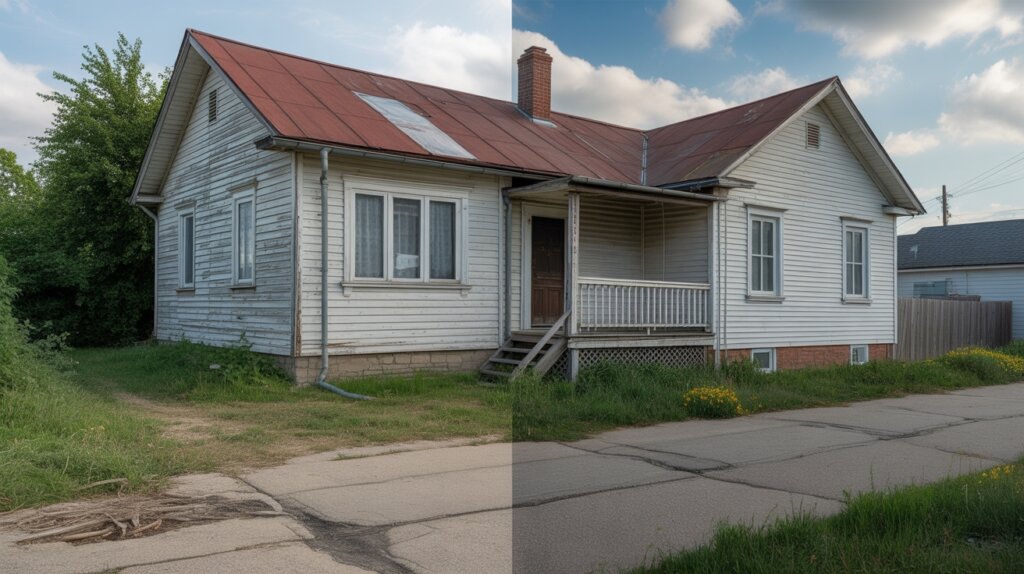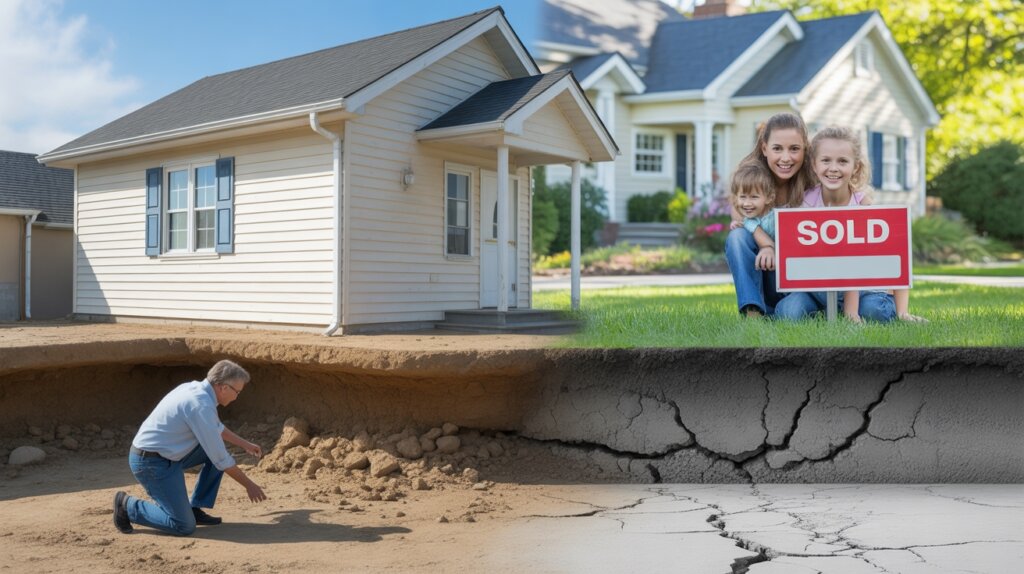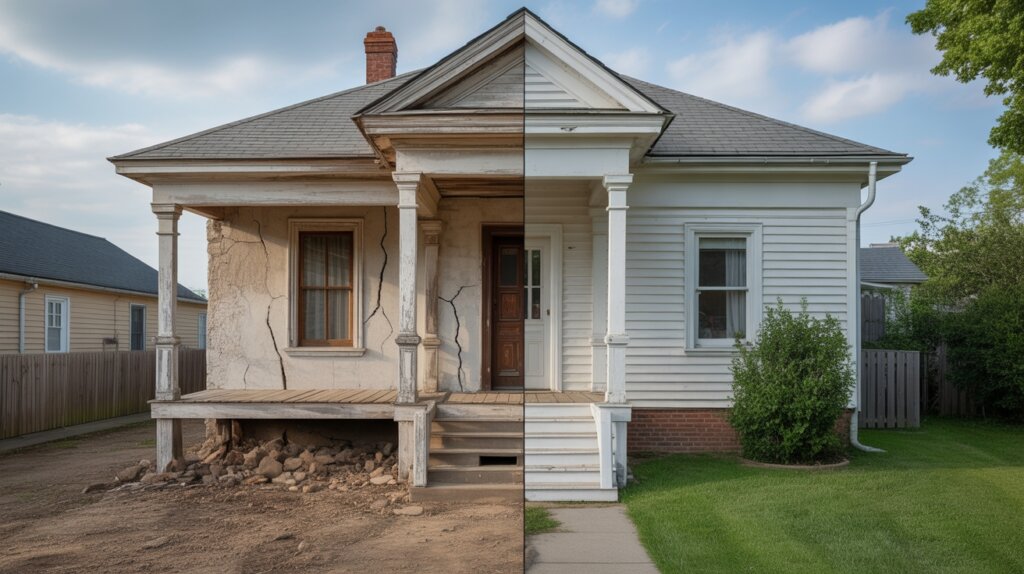Selling a house with foundation damage is not like a normal home sale. Buyers often hesitate, and your home’s value can drop sharply. You may face extra steps and more work just to close the deal.
Foundation problems scare buyers and lenders alike. You must disclose the damage and handle extra inspections. Many buyers will walk away or offer far less money. Selling a house with foundation damage is harder, slower, and usually brings in much less money than a traditional sale.
However, you can still succeed if you know the process. There are ways to get the best deal with the right approach. This blog will guide you through every step so you can sell your home despite its foundation issues.
Key Takeaways
- Homes with foundation damage typically sell for 10–20% less than comparable properties without structural issues.
- Selling with foundation problems often takes longer due to additional inspections, negotiations, and financing challenges.
- Buyers may struggle to secure financing, as most lenders require repairs before approving mortgages on structurally damaged homes.
- Full disclosure of foundation issues is legally required and essential to avoid future liability and disputes.
- Sellers can choose to repair the foundation for a higher sale price or sell “as-is” for a quicker but lower offer.
Understanding Foundation Damage and Its Causes

Foundation damage happens when parts of your home’s base become weak or cracked. The main causes are soil instability, moisture, and poor drainage. If you understand these issues, you can better prepare your home for sale.
Soil type is important because some soils, like clay, expand and shrink with changes in moisture. This movement puts extra pressure on your foundation and can cause cracks or shifting. About 25% of U.S. homes have some foundation trouble due to unstable soil.
The materials used for your foundation also play a role. Concrete, blocks, and stone each handle moisture and shifting in different ways. If your property has poor drainage or large tree roots nearby, these can make foundation problems worse.
Seismic activity, like earthquakes, can also damage foundations. If you know what factors affect your home, you can spot damage early. This helps you make good decisions before selling your property.
Understanding soil support and stability is crucial, as soil problems such as erosion, expansive clay, and loose soil directly impact foundation integrity and can lead to costly repairs.
Signs of Foundation Problems in Your Home
You’ll want to watch for visible wall cracks and uneven floors—two of the most common indicators of foundation issues. Industry data shows that over 60% of homes with structural movement present these red flags early on. Identifying these warning signs promptly can help you assess the severity of the problem before listing your property. Recognizing foundation problems early allows homeowners to explore repair options or determine if a sale should include disclosures about the issue. Monitoring structural damage such as shifting or cracking can prevent further deterioration and costly repairs down the line.
Visible Wall Cracks
Visible wall cracks are a clear sign of possible foundation problems. These cracks often appear near doors, windows, or in bricks. If you see them, you should investigate right away.
Wall cracks can mean the foundation is settling, shifting, or has moisture problems. Homeowners should take photos and keep records of all cracks. Quick action can prevent bigger repairs and protect your home’s structure.
About 60% of U.S. homes on certain soils have some wall cracks from foundation movement. If you need to file an insurance claim, the company will want proof and fast response. Fixing cracks early can also help if you plan to sell your home.
Uneven Floors Noticed
Uneven floors are often a clear sign of foundation problems. Sloping, sagging, or dipping floors usually mean the foundation is settling. If you notice these changes, it is important to pay attention.
Foundation settlement happens when the soil under your home shifts. This movement causes the foundation to lose its original level. As a result, the floors become uneven.
You may also see doors that do not close well or gaps along the baseboards. A strong tilt can be felt when walking across the room. These are all signs of possible structural damage.
If left unaddressed, foundation problems can get worse over time. Buyers may see uneven floors as a serious concern when selling your home. Early repairs can help prevent further damage and costly fixes.
The Impact of Foundation Issues on Property Value

Foundation problems usually lower a property’s value. Homes with these issues often sell for 10% to 20% less than similar homes. Buyers see foundation damage as expensive and risky. Foundation issues can drop a home’s value by 10% to 20%, as buyers view them as costly and risky investments.
Lenders may not approve loans for houses with unresolved foundation problems. If repairs are needed, most lenders require them before financing. This limits your pool of potential buyers.
Sellers with foundation issues often get lower offers. Buyers might ask for discounts or repairs before closing. If you address these problems, you may get better offers.
Knowing these impacts helps you set a fair price. It also prepares you for tough negotiations. If your home has foundation issues, expect a slower sale. Understanding property liens can help when resolving issues related to unpaid debts that may further complicate the sale process. Additionally, being aware of legal and appraisal requirements can assist in navigating the sale more smoothly.
Disclosure Requirements for Foundation Damage
Foundation damage must be disclosed to buyers because it affects a home’s value and safety. Most states require sellers to share any known foundation problems in writing. If you do not disclose, you may face legal problems or contract issues. A thorough title search can help identify existing issues that need disclosure before listing your property. Disclosure forms usually ask about the type and history of foundation issues.
Each state has different penalties if you fail to tell buyers about damage. Accurate information protects both the seller and the buyer. Ensuring a clear title can prevent future legal disputes related to undisclosed problems, thereby safeguarding the transaction. If you are honest, you limit your risk if problems appear after the sale. Proper disclosure keeps you in line with the law during the selling process.
Repairing Foundation Damage Before Listing

Repairing your home’s foundation before listing helps attract more buyers and raises the sale price. Buyers usually avoid homes with visible structural issues. Fixing foundation problems makes your home safer and easier to sell. A licensed structural engineer should inspect the foundation and explain the repairs needed. Engineers can identify the cause and suggest the right solutions. Their advice helps you avoid wasting money on unnecessary work. Foundation repairs might include pier installation or slab jacking.
These repairs stop further damage and help prevent future settling. If you do not fix the problems, you risk losing buyers. Keep all documents, receipts, and warranty papers from the repairs. These records show buyers that the foundation is strong and repairs are complete. If you provide proof, buyers are more likely to trust the home’s condition. Understanding the local market can also help you set a realistic asking price and plan your sale strategy.
Selling a Home “As-Is” With Foundation Problems
Selling a home “as-is” with foundation problems means you do not fix the issues before listing. You must tell buyers about all known foundation and structural problems. This approach helps you avoid spending money and time on repairs. Understanding closing costs can help you better anticipate expenses involved in the sale process, even when selling as-is. Buyers will likely offer less because they need to pay for repairs.
Most homes with foundation issues sell for 10–20% less than similar homes in good condition. Cash buyers and investors are often interested in these properties. Inspection reports or engineering assessments can help prove the extent of the problems. These documents set clear expectations for buyers. If you provide proper documentation, the process may be smoother for both parties. Additionally, being transparent about property condition builds trust and can facilitate a quicker sale.
How Foundation Damage Affects Buyer Interest
You’ll notice foundation damage immediately lowers buyer confidence, as structural issues signal costly repairs and uncertainty. Data from the National Association of Realtors shows many lenders won’t approve mortgages for homes with unresolved foundation problems.
This means you’ll face a smaller buyer pool and likely longer time on market. Additionally, foundation issues can lead to additional repairs, further discouraging potential buyers or lowering offers. Understanding how to prepare your home for sale despite these issues can help mitigate some of these challenges.
Reduced Buyer Confidence
Foundation problems often lower buyer confidence. Most buyers worry about how safe and stable the home really is. If your house has visible cracks, buyers may hesitate to make an offer.
Even if you get a professional inspection, some doubts may remain. Reports show that homes with foundation issues sell for less money. These homes also stay on the market longer.
Buyers often feel unsure for several reasons. They fear repair costs might go up after closing. Some worry about finding more hidden problems later.
Many buyers also think about resale value. If they struggle to sell later, they may lose money. All these concerns can mean fewer buyers are interested in your home.
Limited Mortgage Approval
Foundation damage makes it hard to get a mortgage for your home. Most lenders see these properties as risky and may refuse loans. If you want to sell, buyers using conventional, FHA, or VA loans may not get approved.
The National Association of Realtors says almost 40% of failed sales come from financing problems. Foundation issues are a leading reason for this. Even if your home looks great, lenders still worry about structural problems.
Your best chance is to find a cash buyer or someone using a special renovation loan. These loans often have higher rates and tougher requirements. If mortgage approval is limited, fewer buyers will be interested and your home may be harder to sell.
Financing and Appraisal Challenges
Financing and appraisal can be difficult if a house has foundation problems. Lenders and appraisers see structural damage as a risk. This often makes selling the home more complicated.
Lenders may require repairs before approving a mortgage. Appraisers might lower the home’s value because of needed repairs. These issues can reduce the number of buyers interested in your property.
If you want to use FHA or VA loans, be aware of strict rules about structural safety. Some lenders will not finance homes with major defects. Understanding these problems helps you plan your sale more effectively. Additionally, clear title and property condition can influence the financing options available and facilitate a smoother transaction.
Negotiating With Buyers Over Repairs
Negotiating with buyers over repairs means you must agree on how to handle foundation issues. Buyers often ask for a price reduction, repair credit, or for repairs to be finished before closing. If you have reached this stage, negotiation becomes very important. Offering a repair warranty from a trusted contractor can boost buyer confidence. If you show all inspection reports and repair quotes, buyers will feel more secure.
Homes with transferable warranties often sell faster by 10-15%. You have a few good negotiation options. A repair warranty can make buyers feel safer. Giving a repair credit helps keep the sale moving, while finishing repairs before closing could get you a higher price. Using these tactics shows you are proactive and honest. If you use them well, you can reach better terms and reduce buyer worries. Proper documentation about the property’s history and repairs can further support your negotiations and provide clarity to the buyer.
Working With Real Estate Agents Experienced in Foundation Issues
Working with a real estate agent who knows about foundation problems makes selling easier. Such agents have experience with homes needing structural inspections and can help you handle buyer concerns. They help you sell your home, even if it has foundation damage.
A specialist agent sets a fair price based on similar homes with foundation issues. They help with disclosures and provide inspection documents to reassure buyers. If you need marketing, they target buyers or investors who accept repairs.
Their experience helps you avoid mistakes and delays. If you want a smooth sale despite foundation problems, choose an agent with structural knowledge. This approach can protect your interests and improve your results.
The Role of Home Inspectors and Structural Engineers
Home inspectors and structural engineers both play key roles when selling a house with foundation damage. Home inspectors look for visible problems like cracks or water issues. Structural engineers check the strength of the foundation and how much damage there is.
If you get reports from these experts, you can show buyers the real condition of your home. Lenders and buyers may require these reports before making decisions. If you have clear reports, you might reduce negotiation time and build trust with buyers.
Structural engineers will also explain what repairs are needed and why. Their advice follows industry standards and helps you plan next steps. If you follow their guidance, you can make your property more attractive in a tough market.
Marketing Strategies for Homes With Foundation Damage
You’ll maximize your chances of selling by emphasizing the property’s repair potential and positioning it as an opportunity for value-add investors. Data shows investor buyers make up a significant portion of transactions involving homes with structural issues. Tailor your marketing materials to highlight projected returns after remediation and appeal to buyers seeking distressed assets.
Highlighting Repair Potential
Highlighting a property’s repair potential can make it more attractive to investors and buyers. Foundation repairs can increase a home’s value and open up new design options. If the repair is done well, buyers may see opportunities for landscaping and painting.
Providing repair estimates and contractor contacts can build buyer confidence. Third-party assessments show the real value-add potential of the property. If you offer examples of successful renovations, buyers can better imagine the finished product.
Homes with recent structural improvements often recover up to 70% of repair costs at resale, according to the National Association of Realtors. Showing before-and-after case studies can help explain this return on investment. Design renderings can also show how upgrades will look when repairs are complete.
Targeting Investor Buyers
Investor buyers look for properties with potential, even if there are foundation issues. They see these homes as projects to increase value. If you want to attract investors, you must focus on the home’s possible profit.
You should provide clear information about any repairs needed. Share recent structural reports and accurate repair estimates. If you do this, investors can judge the risks and possible returns.
Investors often buy homes that need work and have funds ready for repairs. If you show detailed documents, you build trust and lower their concerns. This approach helps your property stand out as a good investment.
If you highlight local sales, rental demand, or future value, you add more appeal. Good data helps investors make quick decisions. This can lead to a faster and smoother sale.
Timeline Differences Between Damaged and Traditional Sales
The timeline for selling a damaged home is usually longer than for a traditional sale. Foundation issues add extra steps and delays to the process. These delays set damaged homes apart from those in good condition.
Buyers often ask for special inspections if they suspect structural damage. These inspections can take several days or weeks to complete. If the results show problems, repairs may be needed before moving forward.
Lenders may not approve a mortgage for a home with foundation issues. This can slow down or even stop the sale. Some buyers may back out if their loan is denied.
If a problem is found, negotiations usually take longer. Buyers might want a price cut, repairs, or credits before agreeing to close. These talks can add more days or weeks to the timeline.
Costs and ROI of Repairing Foundation Damage Before Selling
You’ll want to weigh the typical foundation repair costs—often ranging from $2,000 to $10,000—against the potential increase in your home’s market value. Data shows properly executed repairs can boost buyer confidence and help you command a higher sale price. Understanding the likely ROI will guide your decision on whether to invest in repairs before listing.
Typical Foundation Repair Costs
Foundation repair usually costs between $2,000 and $15,000. The exact price depends on the damage, foundation type, and local labor rates. You may need a professional inspection if your property has settlement or soil problems.
Different repair methods have different costs. Piering is more expensive than simple crack repairs. Concrete slabs, crawl spaces, and basements all have unique repair needs.
More severe or widespread damage will cost more to fix. If the soil under your home is unstable, repairs may be more complex. Larger jobs require more materials and labor, raising the total price.
Impact on Home Value
Unresolved foundation damage usually lowers a home’s value by 10% to 20%. Buyers worry about repair costs and future problems. Lenders may refuse to finance homes with serious foundation issues.
Appraisers will reduce the home’s value to account for these risks. Many buyers avoid homes with foundation settlement, leaving mostly cash investors interested. This smaller buyer pool often leads to lower offers.
If you fix the foundation before selling, you can ask for a higher price. Addressing soil problems early helps keep your home attractive to more buyers. Repairing issues may also make it easier to get financing.
ROI of Repairs
Repairing your home’s foundation before selling can help you get a better price, but it is not always worth the cost. Foundation repairs usually cost between $2,000 and $15,000. You should compare this expense to the extra money you might get from the sale.
Neighborhood trends can affect your decision. If most nearby homes sell quickly with few repairs, fixing the foundation might not increase your profit. Local market conditions matter.
A strong foundation helps with home staging and builds buyer trust. Buyers often feel more confident when they know the structure is solid. This can make your home more appealing.
Recent data shows that homes with structural repairs sometimes sell for 10-15% more. However, you may not recover the full repair cost. Always review local sales data before deciding.
Conclusion
If you are selling a house with foundation damage, you will likely face unique challenges compared to a traditional sale. You may receive lower offers, and the process may take longer because buyers and lenders are cautious. If you understand your options and know the laws, you can make better decisions.
If you want to avoid repairs or market uncertainty, you might consider selling for cash. We buy houses for cash in any condition and can offer a quick, hassle-free sale. If you choose this route, you can skip the delays and costly repairs.
If you are ready to sell your house fast, let us help. We at OC Real Estate specialize in buying homes with foundation issues. Contact us today for a fair cash offer and a smooth selling experience.

